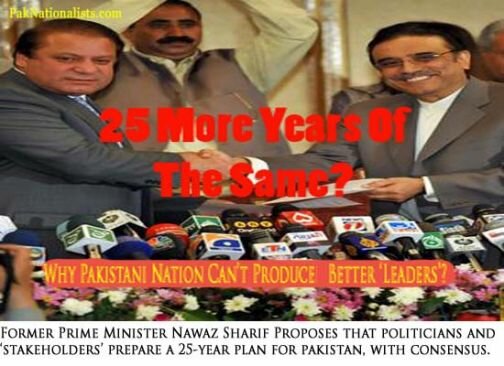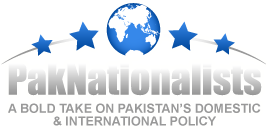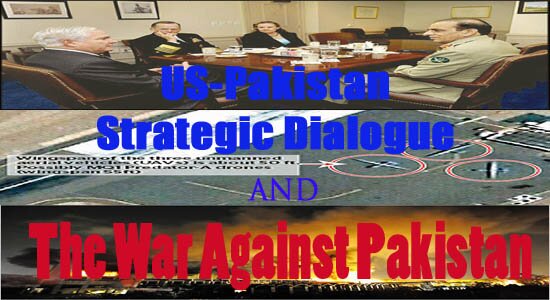
 Print This Post
Print This Post  Email This Post
Email This Post
By AHMED QURAISHI | Saturday | 30 October 2010
WWW.PAKNATIONALISTS.COM
ISLAMABAD, Pakistan—Former Prime Minister of Pakistan Mr. Nawaz Sharif has issued a statement asking the nation’s politicians, judiciary and the military to create a 25-year plan he called the Charter of Pakistan. The plan, he said, should be produced ‘with consensus’ to pull Pakistan ‘out of its problems.’
Our politicians are just discovering what statesmen in other nations take for granted. Better late than never.
There is no reason to doubt Mr. Sharif’s sincerity in floating this idea. But he should also ponder with an open mind what many skeptic Pakistanis say about it. Seen from another context, this noble idea can easily turn into 25 more years of the same tested, tried and failed politics in Pakistan. More bluntly: another lease on life for dying Pakistani political elite.
CONSENSUS
The keyword in Mr. Sharif’s proposal is consensus. If Pakistan had concentrated on indoctrinating its citizens the way Israel, China and the United States have done with theirs, we could still have a common ground to start from. But in the present situation, the Pakistani State has allowed shortsighted and failed political parties to wrestle legitimacy from the State’s hands. Now these parties have become self-appointed sole representatives of entire groups of citizens: one party claims it represents all Urdu-speaking Pakistanis [which is a contradiction in terms since the language is owned by the State and the nation doesn't belong to any specific group, but that's another debate]. Another party claims it represents all Pashto-speaking Pakistanis [again, the language is owned by the State and is an integral part of the Pakistani identity]. The two largest parties, the PPPP and the PML have also fallen in the same pit, becoming more narrowly-based regional parties than national.
Pakistanis are not as divided as these parties make them out to be. Pakistanis have also watched with horror over the past three years as the respective leaders of the two parties came dangerously close to provincialism. President Zardari has indirectly threatened to use the so-called Sindh Card if his government was toppled. [He rejected the idea altogether when asked about it, but actions speak louder.] On PML’s side, Mr. Sharif’s faction is ironically guilty of the same since the other faction, the PML-Q, remains slightly better represented nationally across Sindh, Kashmir, Balochistan, Punjab, Pakhtunkhwa, and Baltistan.
Most of the existing parties run private and lethally-armed militias and have perfected the art of street chaos and messy/uncivilized politics. They often have nothing to offer their voters except whipping up linguistic differences. This assessment is a harsh reality. Best of all, there is no law – yet – to stop these parties from perpetuating this flawed concept of how political parties should behave internally and in public.
PLANNING REQUIRES TRAINING
There is no tradition for planning in almost all of the major parties. Membership and career path within the parties depend on loyalty to a permanent, lifelong party chief. It’s more a modern form of a medieval tribe than a modern political party. There are isolated bright exceptions of some politicians succeeding in taking out party ‘planning documents’. Senator Mushahid Hussain Syed of PML-Q is a case in point and he has taken this talent with him to the Senate Foreign Relations Committee where he supervised the release of elegant and meaningful policy planning documents. But his talent remains confined to his person and has not rubbed off on the wider political culture in his or in other parties. For the rest of the political parties, planning for the future – let alone for 25 years – remains limited to a lousy collection of bullet-points and generalized essay-writing.
A LONG SHOT
It is impossible to create consensus on anything in this fragmented, violent and shallow Pakistani political environment.
Moreover, in some cases, a State needs to impose discipline and not wait for it to develop. In the West, for example, discipline within a democratic system of governance evolved over centuries, not decades. The process included wars, famines, genocide, redrawing of borders, ethnic cleansing, and more wars. We in Pakistan can’t wait for due process to take its course. Israel is not the best of examples here for political reasons but even now there are many interpretations among Israelis for what Israeli history should be and what type of modern state Israel should be. The debate goes on. But for all the democracy and pluralism, only one interpretation for Israel’s history is enforced from top to bottom. And it was not put to vote but implemented from the inception of the State in 1948.
In China, Singapore, Malaysia, and Dubai, discipline was enforced. No one invited ‘stakeholders’ to sit down and develop consensus, except within adherents of the system, the ‘believers’, so to speak. There has to be a minimum common ground to start from. You can’t invite someone who believes in breaking up the country and another one who believes in one-nation theory and then expect to create a 25-year consensus.
Even in a mature democracy like the United States, a president went to war in Iraq despite half of the nation vehemently opposing it. There was no consensus at all.
In the Gulf region, there is one emirate that is deteriorating on all the vital indicators every year, and that is Kuwait. It currently has 38 billion dinars in its savings account, which means around $150 billion dollars, with small geography and a population of less than two million. And yet the Kuwaiti State has been unable to build any major universities and hospitals since the early 1980s. The reason is political instability. An opposition-dominated parliament and a government dominated by the ruling family have been at loggerheads since the introduction of parliamentary democracy in 1961. The United States and the West hailed the Kuwaiti democracy with its noisy free press as a role model for autocratic Saudi Arabia, UAE and Oman. But that was two decades ago, when the Western coalition that liberated Kuwait from Iraqi occupation insisted the Al-Sabah ruling family restore democracy and empower the country’s opposition groups. Today, everything is falling apart. In April and October this year, Kuwait’s reformed-minded Emir blasted the parliament and the constitution and blamed them for stalling development.
Forget about consensus in Pakistan. With $150 billion, the size of the city of Karachi, and a population of two million, Kuwait has been unable to create consensus for two decades on whether to allow international oil companies into Kuwaiti oilfields, whether to open up the economy or protect it, to build new cities or not, and the list is endless. Now the rulers of Qatar, Bahrain, UAE, and Oman laugh at the Kuwaiti democratic experiment. This is ironic because there was a time when these emirates saw Kuwait as a model for social development.
This doesn’t mean consensus-building is bad or that democracy doesn’t work. It still is the best system of governance so far, provided it is adapted to local conditions. What can work in the United States and Britain doesn’t even suit Italy, let alone Pakistan.
In Pakistan, media, social and political freedoms will always exist. But without limiting them, the State will have to intervene in the interim and enforce discipline and seize back powers taken away by failed political parties. The State will have to tolerate dissent but not chaos, mess and violence if they accompany democracy.
What is our link to democracy? It is limited to our elites studying it in Western colleges. When they return to Pakistan to rule, their actions are the opposite. In a society like ours, we don’t have the time or energy to evolve democracy and do social, educational and economic development at the same time. You can either get busy in developing consensus or developing the country. You choose.
Despite skepticism, I fully back Mr. Sharif’s idea of building consensus for a 25-year plan for Pakistan. But if the politicians fail to build consensus, will they agree then on the need to step aside, spare us their politics, and let the rest of us force changes into the system to allow new thinking and new faces?
© 2007-2010. All rights reserved. PakNationalists.com
Verbatim copying and distribution of this entire article is permitted in any medium
without royalty provided this notice is preserved.







These people do not deserve any respect whatsoever, they have the cheek to sentence us to another 25 years ? This proves that the system is itself corrupt and rigged. We real Pakistanis have to ask our military “gold medalists” to ACT and remove these buffoons now and forever
With all due respect to a very small number of persons, who might have been dragged into a system that is now in general terms is reffered as ‘Politics’, there is no politics in Pakistan.
I sincerely hold the view, that certain tried and tested elements of this profession are imposed upon our nation, just because they would naturally hinder the national progress and that surely is object of those who impose these so-called politicans.
I pray to Allah (swt) to grant our people the vision to recognise the sheep from the wolves in the sheep skin.
Dear Ahmed Quraishi
Nawaz Sharif and the rest of our political leaders talk about democracy which is “western”. The other day when I discussed this matter here in Sweden, I was informed that “democracy takes 50 years to get established”. So even there, Nawaz Sharif is 25 years short.
For any nation which has remained under foreigner’s rule, and in Pakistan’s case this region has been under foreign domination for centuries (starting from Mohamad Bin Qasim, Moghals and the British), it takes at least 2 generations or 40 years to get rid of the slavish mentality. Bani Israel had to wander around in Sinai for 40 years.
However, our ruling elite could not shuffle off that slavish mind set even after 63 years. Free Mind brings sobriety and their nation building exercise is based on certain ideology which is based on the history of their own region. They neither look towards East or West, nor to the Kabah for attesting their plans.
To follow blindly anyone is not wise. It speaks volumes of such a mentality. As such, it is time to take that “Baba ji sitting under the peepal tree, smoking his hukkah” for his words of wisdom. How to build this nation, from a scratch. His words will be original, belonging to this soil, un adultrated and having the freshness of “baad-e-saba”.
Warm regards,
Munir A.Varraich
“The Anchorage”
Harryda
Sweden
Tel:
About your comments regarding MQM. Show me one statement withing last 10 years, of MQM claiming the representation of just Urdu speaking people?
And about you objection, Urdu speaking people is the term used for people whose mother tongue is Urdu. If its national language of the country, it dos not neccesary makes it mother tongue of all the people, infact its mother tongue of only 8% of people. Its national language because its the second language of 90% of people. (spoken and understood by).
Its a pity that your views usually are very logical but when it comes to MQM, this was your objection, which you deemed necessary to include here just because of ” Ikhtalaf barayay Ikhtalaf” or objection just due to hatred.
Dear Syed Sahib,
You are right in that MQM has stopped claiming representation of ‘Urdu-speaking’ Pakistanis publicly. But it is still implicit in its objection to people who speak other languages to come and in live Karachi, as if MQM [or ANP, or PPP, etc.] have a monopoly over the city and its Pakistani residents. MQM is as much a language-based party as ANP or the scores of smaller Sindhi parties are, or the new emerging parties/politicians who claim to represent Seriaki-speaking or Hazara-speaking Pakistanis. The fact is that none of these politicians/parties were annointed by anyone to represent entire languages. This is why it is ridiculous that PPPP has suddenly become a representative of Sindhi-speaking Pakistanis, or that PML-N has become a bastion of only those Punjabis who are loyalists of Sharif family [rest of Punjabis don't count.]
Second, all Pakistanis, the absolute majority certainly, speak and understand Urdu, the national language of Pakistan and the language evolved over several centuries of Muslim rule over India. They are all Urdu-speaking today by force of reality. And Urdu and all the other languages of Pakistan are Pakistani languages without distinction. I own Baloch language as my own even if I don’t speak it. This distinction of ‘native’ Urdu-speakers, or those whose ‘mother-tongue’ is Urdu, is a joke. Show me a single Pakistani in 1947 who said I am ‘Urdu-speaking’ Pakistani? Urdu was as much native to Muslim Delhi as it was to Lahore. In fact, Lahore had the biggest printing presses of Urdu anywhere. Those that you term ‘native Urdu-speaking’ Pakistanis are a diverse group of educated and patriotic Pakistanis who are divided among the major Pakistani political parties. MQM represents only those who support it, not all Urdu-speaking Pakistanis. ANP represents only those Pashto-speaking Pakistanis who support it, and not all Pashto-speaking Pakistanis.
The real ‘Urdu-speakers’ before Pakistan’s independence were the Muslim elites and residents of Muslim Delhi and its surrounding areas. Most of them moved to different parts of northern Pakistan, and not just Karachi. For the residents of Muslim Delhi, Lahore was the closest city to them in terms of Muslim culture and history.
I do not consider MQM or ANP to have any monopoly over Urdu- or Pashto-speaking Pakistanis. These two parties must be stopped from dividing Pakistanis. MQM does not have a monopoly over Karachi and ANP does not have a monopoly over Khyber Pakhtunkhwa. In fact, I am one of those Pakistanis who look forward to a Pakistan where provinces are named after districts or cities or towns, and not languages. This is going to happen and we will see this in our lifetimes. And that is when we will also get rid of political parties that make a living out of language-based divisive politics instead of performance and services.
Quraishi Sb.
Your comments about language based political parties – MQM, ANP etc with reference to Karachi need to be revised. When a political group bases its membership on language it is trying to assert its grievances. In this particular case it is the right to their language. To make that claim stronger the group goes to extreme so as to have some negotiating room.
All nationalities – Punjabis, Sindhis, Baluchis, Pashtuns and the “Mohajirs” national rights of culture, language etc. have not been given due space in national affairs and policy making. Any political party which claims to be for Pakistan, first and foremost have to accept that Pakistan is a multi-cultural, multi-lingual state. It has to be in party’s manifesto that all national rights of all nationalities within Pakistan are EQUAL and party will promote MUTUAL RESPECT of all nationalities without any discrimination.
That should take care of the horizontal integration. Then ofcourse is the vertical integration – haves and have nots. For that a major surgery is always required. Economic Policies based on free-enterprise has added to the poor of Pakistanis – especially the growers and the workers, who are the backbone of Pakistani economy.
Munir Varraich
Sweden
Dear Varraich Sahib,
I agree with the entire thrust of your argument. Except that you appear to be constructing the entire political game on linguistic basis. That is incorrect and is not the right interpretation of democracy. Citizens should associate into political parties on the basis of services, economic, domestic and foreign policies, and not on the basis of language.
A few more points:
1. Horizontal integration is the responsibility of the State. It must lead it. Rights of Pakistani citizens are not to be defined on linguistic basis but on the basis of equal duties and responsibilites.
2. The objective of the political system should be to strengthen Pakistani nation and identity. You can’t allow political parties to snatch the State’s right to represent its citizens. Language-based political parties are a recipe for division and disaster. How and where can you draw a line when a politician fails to offer anything good except to sharpen linguistic divisions because it keeps him relevant?
3. The job of political parties is not to represent languages. It is to provide the best recipe [manifesto] for social and economic development.
4. Competition among political parties must be limited to social, economic and political development of the district where the party is located, the State and the nation.
What is currently happening in Pakistan is that political parties are becoming a cause for balkanization. Linguistic and sectarian based political parties should be proscribed, which is the case in most stable nations of the world.
Reference a word you used, ‘hatred’. It just shows your own mindset.
People of Karachi are among the most patriotic Pakistanis, without a doubt. Given a chance, some day soon, they will reject all these political parties that enrich themselves by exploiting this city and turning it into a center of criminal politics, whether it’s MQM, ANP, PPPP or any other party.